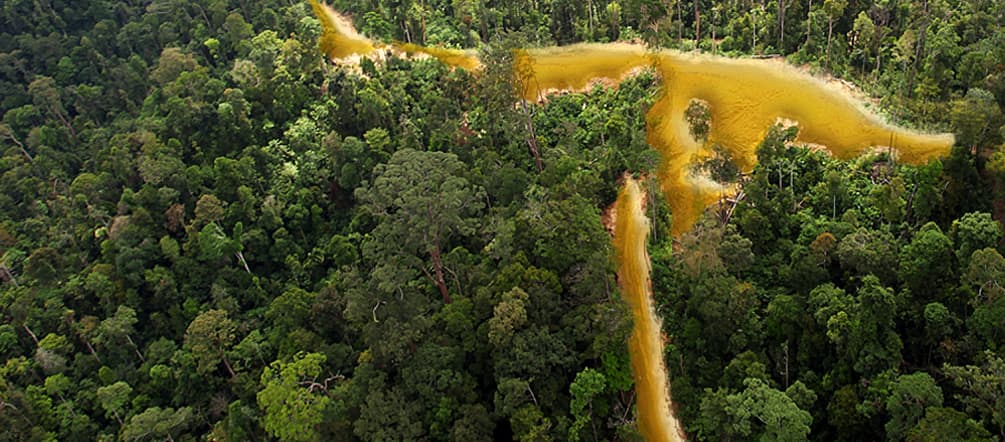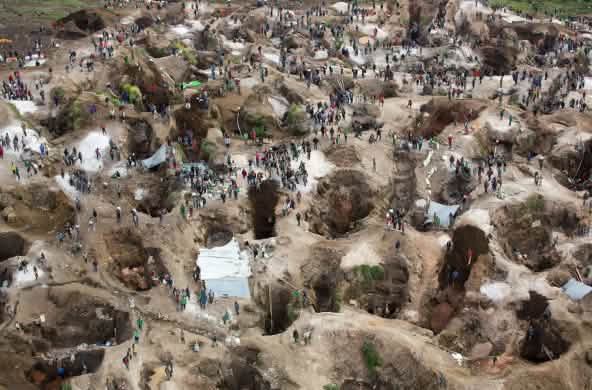
Completed campaign
Guiana’s living treasures are more valuable than gold
The French government has authorized the mining of gold in the Guiana Amazonian Park in French Guiana. By issuing the mining concession, Paris is not only ignoring the interests of the park’s inhabitants and the national park administration, but also violating national law. Please support the protest the rainforest advocates
To: Mr. Arnaud Montebourg, Minister of Industrial Renewal; Mr. Denis Labbé, Prefect of French Guiana
“”The tiny village of Saül is nestled in the heart of the French Guianese rainforest. For the handful of nature lovers and researchers that arrive there by air, the hamlet is the starting point for tours and expeditions in the still largely unspoiled South American jungle. The visitors are the economic mainstay of the local population. No roads lead to the outside world.
Founded in 2007, the 33,900 square kilometers of the Guiana Amazonian Park is a place of tremendous biodiversity: in addition to jaguars, pumas and tapirs, it is home to 186 other mammal species, as well as 718 bird, 480 freshwater fish, and 261 reptile and amphibian species. And the list – which also includes more than 1,200 species of trees – is continuously growing thanks to new discoveries.
“The future of Saül depends on the incomparable appeal that the richness of nature has for visitors, be they ecotourists or researchers”, as the park’s director, Frédéric Mortier, noted as early as 2009. Then as now, he rejects the application by REXMA, a French mining company, to exploit the Limonade river for gold.
Nevertheless, on October 26, 2012, French industry minister Arnaud Montebourg in faraway Paris awarded the mining permit. As an overseas region, French Guiana is a part of France and the EU. The “Limonade permit” grants the company the right to dig for gold in the rainforest soil and river sediment within an area of ten square kilometers, and use highly toxic chemicals such as cyanide and mercury that would inflict lasting damage to the region’s ecosystems.
Please support the people of Saül and help them save the rainforest in French Guiana from gold mining. The mining permit must be annulled immediately.
The French government is violating its own laws and torpedoing years of efforts to stem gold mining in the rainforest. Hundreds of illicit operations with around 15,000 mostly Brazilian workers are digging up the jungle and river beds in French Guiana in search of the precious metal.
To bring the situation under control, the authorities developed a mining land use plan that took effect in January 2012. Mining of any kind is not allowed in the national park and neighboring regions. The Limonade permit applies to an area in the middle of the prohibition zone.
The inhabitants and the town council of Saül see their livelihoods in jeopardy, and have been protesting against the mining permit with a petition to the government. The authorities in charge and international environmental organizations also oppose the mining project.
Guiana Amazonian Park, an open-air laboratory
The Guiana Amazonian Park (Parc amazonien de Guyane, PAG), which was established by decree in 2007, is a well-preserved primary forest area with extraordinary biodiversity. With a total area of 3.39 million hectares, the park is the largest protected area of the European Union – albeit in a tropical environment in South America.
The Guiana National Park is notable for its wide variety of landscapes - from swamps to mountain forests to inselbergs. Its animal life (in addition to tapirs, primates, and jaguars, it is home to 180 other mammal species, as well as 480 freshwater fish, 300 reptile and amphibian, 720 bird, and hundreds of thousands of insect species) and plants (1,200 species of trees, often with several hundred different ones on a single hectare, 85 palm species, and hundreds of species of orchids) are also unique.
If REXMA were indeed to operate a gold mine in this zone, it would destroy a part of this ecological treasure trove. But that is not all: Since the mines are to be built upriver and near the basin that drains into Limonade bay, the watercourses of the region would inevitably transport mercury and other mining waste into other vulnerable ecosystems of the national park.
The Guiana Amazonian Park Charter
The national park consists of two zones: the “core”, which makes up around 60 percent of the total area, and a zone of “voluntary accession”. All who are active in this area (local communities, traditional authorities, government services, and socio-economic actors and associations) are drawing up a charter to “define the direction of regional development and conservation.” The charter is currently being debated and put to a vote. The members of a public commission of inquiry are slated to meet in all involved communities to listen to the views of the residents from January 21 to February 7, 2013.
REXMA, a longtime struggle for the residents of Saül
During the commission’s visit to the village, the population of Saül will make it clear to the commissioners that they reject gold mining on their territory. It is not the first time that the residents of the isolated village in the jungle are taking a stand against a decision that threatens their existence.
They had already protested vigorously in 2006, when REXMA was granted an exclusive exploratory permit. Already on that occasion, the responsible industry minister François Loos ignored the objections of the mayor of Saül, the mining committee, and the prefect. Today, the inhabitants fear that a precedent is being set. They ask themselves how the minister will be able to prevent other mining companies from becoming active in the region once he has granted REXMA a permit.
REXMA first applied for a mining permit in 2008, and was rejected by Frédéric Mortier, director of the Guiana Amazonian Park. The publication of the ministerial decree in the French official gazette on December 11, 2012, triggered an outcry by the population of Saül, responsible organizations (including the French committee of the International Union for the Conservation of Nature and Natural Resources, IUCN), politicians (in particular Chantal Berthelot and José Gaillou), researchers (Scott Mori) and associations (Fédération Guyane Nature Environnement and others). The responses were unanimous: incomprehension and rejection not only of the gold mining permit itself, but also of the failure to consult with affected residents and institutions.
To: Mr. Arnaud Montebourg, Minister of Industrial Renewal; Mr. Denis Labbé, Prefect of French Guiana
Dear Minister Montebourg, dear Prefect Labbé,
According to Official Gazette No. 11 published in December 2012, the Minister of Industrial Renewal granted the mining company REXMA a permit to exploit an area of ten square kilometers along the Limonade river, a few kilometers from the village of Saül in the Guiana Amazonian Park in French Guiana.
This decision is not comprehensible from any perspective:
The permit relates to a designated rainforest reserve in which gold mining is prohibited by the Guianese (Schéma Départemental d’Orientation Minière et d’Aménagement) mining land use plan that took effect on January 1, 2012.
The nature reserve is characterized by remarkable biodiversity, which is the subject of a variety of scientific – in particular botanical – studies. The affected area is part of a zone that was incorporated into the Guiana Amazonian Park on the initiative of its residents. This area is ecologically very sensitive and now extremely threatened, as its rivers would carry the pollution from the mining operation into the ecosystems in the heart of the national park.
Further, the permit conflicts with the Saül Council decision of January 29, 2008 to establish a ten-kilometer protection zone around the town in which mining is prohibited. The permit issued to REXMA applies to an area that is less than five kilometers from the village.
The residents of Saül see their livelihoods and the development of the region’s exceptional natural heritage – the basis for tourism and research – at risk. With this letter, I would like to show my support for the inhabitants.
I am curious as to which organizations or institutions responsible for the territory gave their approval for the permit. It appears that the decision was made unilaterally by the industry ministry without consultation, a move that I find appalling.
I therefore call on the Minister of Industrial Renewal to annul the “Limonade” permit that he issued to REXMA on October 26, 2012.
I call on the Prefect to observe the existing mining law in French Guiana, and therefore not to allow REXMA’s mining activities.
Yours sincerely,

